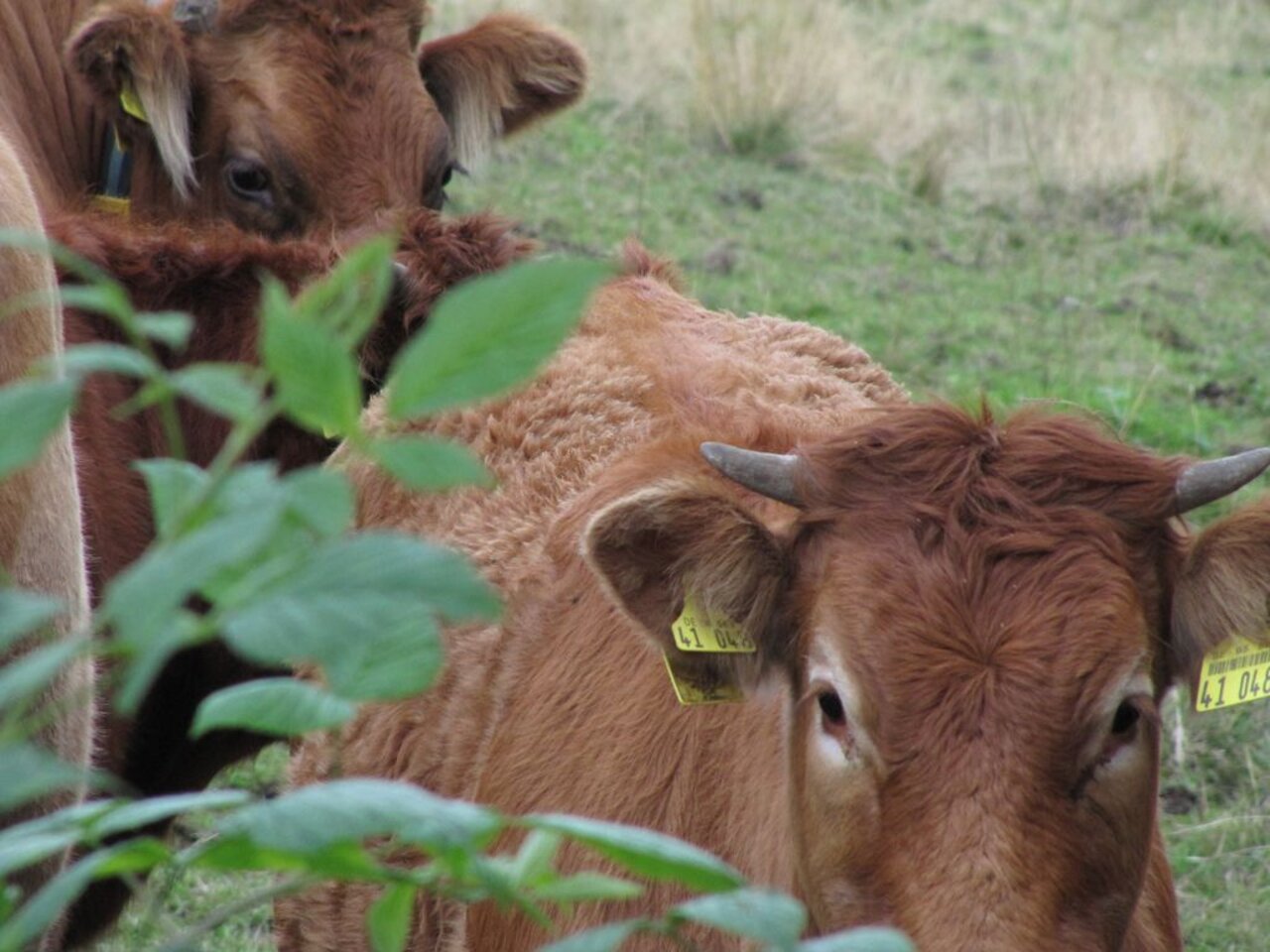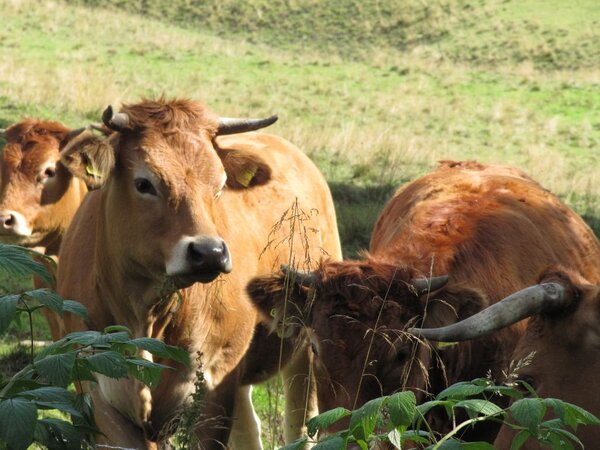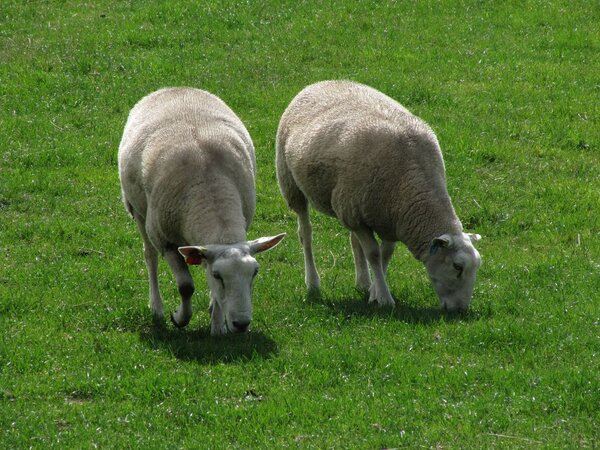Project
Establishment of web-based decision trees for parasite prophylaxis through future-oriented pasture management in agricultural practice and consultancy

Pasture Parasite Management – Web-based Decision trees – future oriented planning of pasture management for ruminants to reduce the infection with gastrointestinal worms and to reduce the use of medications - establishment of an online tool in agricultural practice in Germany
Pasture husbandry is considered to be particularly animal appropriate and is, according to polls, desired by consumers. However younger animals in particular are often afflicted with infections by gastrointestinal parasites while at pasture. Previously developed decision trees available online could be an aid in future-oriented pasture planning. How do farms perceive the work with this online tool? Can it provide support in pasture management to individual farms? Does it reduce the stress on the animals or does the use of the decision tree lead to less use of anthelmintics? These questions are addressed in a model and demonstration project of the Thünen Institute for Organic Farming carried out in 80 farms in cooperation with six consultancy organizations.
Background and Objective
Controlling gastrointestinal worms is crucial to any pasture system for ruminants. To support the farmer's foresighted planning of pasture management and avoid excessive deworming four decision trees are created and put online. They are accessible free by www.weide-parasiten.de. There is one decision tree for young cattle in intensive dairy husbandry and young cattle in suckling-cow management as well as one decision tree for economically kept sheep and goats, respectively. To support the implementation a consulting project is started. 80 farms distributed all over Germany get additional information from theirs consulting bodies about preventive parasite control by pasture management and the use of web-based decision trees. The acceptance and the sustainable success of those measures get evaluated scientifically.
Approach
Pasture keeping is the husbandry form nearest to nature for ruminants. In pasture husbandry however, infections with stomach and intestinal parasites are unavoidable and lead, untreated, to significant economic losses, particularly in young animals. In addition, they can present a serious health problem for the afflicted farm animals and harm the animals’ well-being. Most at risk are young animals in their first pasture season, since the development of resistant own-body immunity against individual strongylide species requires several months. The treatment of these endoparasites is, as a rule, based on the use of prescription animal medication. For environmental and consumer protection reasons, the amounts of the medications used in farm animal husbandry are to be reduced as far as possible. In parasite treatment it would thus make sense to use a well-planned pasture management with monitoring of the elimination (parasite) eggs.
For this reason, in an earlier R and D project, web-based decision trees were developed to support practitioners and were already published in 2010 (www.weide-parasiten.de)
In the context of this project, promoted in the framework of the “Model and Demonstration Project Animal Protection” from the Federal Office for Agriculture and Food, the online decision trees should be introduced through six consultancy agencies (agricultural chambers of Schleswig-Holstein and Lower Saxony, the Animal Epidemic Insurances in Mecklenburg-West Pomerania and Thuringia as well as the state offices of agriculture in Hessen and the Bavarian State Agricultural Office as a model for practical dairy cow, suckling cow, goat and sheep husbandry in Germany.
The purpose is to:
- Promote the pasture keeping of ruminants
- Support the health of pastured animals
- Sustain a reduction of anthelmintic use
- Reduce the development of resistance (in the case of too much medication)
on a total of 80 farms. Project staff members from the Thünen Institute of Organic Farming are checking the effectiveness of the use of these tools with regard to the stress with gastrointestinal worms, as well as the use of anthelminthics (deworming substances) and the acceptance by participating farmers.
Controlling gastrointestinal worms is crucial to any pasture system for ruminants. To support the farmers’ foresighted planning of pasture management and to avoid excessive deworming, four decision trees were created and put online. They are accessible free of cost by www.weide-parasiten.de. There is one decision tree for young cattle in intensive dairy husbandry and young cattle in suckling cow management as well as one decision tree for economically kept sheep and goats, respectively. A consulting project has been started to support the implementation. A total of 80 farms distributed throughout Germany get additional information about preventive parasite control by pasture management and the use of web-based decision trees from their consulting agencies. The acceptance and sustainable success of those measures is evaluated scientifically.
Agricultural Practice and Consulting
A total of 80 pilot farms nationwide – of these more than 50 with dairy or suckling cow keeping – were supported together with consultants from chambers of agriculture /animal epidemic insurers for pasture management for parasite prophylaxis through the use of decision trees and the monitoring of parasite infection via collective feces samples. Within the 24-month project time period, an annual consultation visit takes place with a consultant from the responsible organization in which, together with the farmer, the online decision trees for the individual farm are applied. The recommendations resulting from the use of the decision tree are adapted appropriate to the individual farm and then implemented on the farm.
The individual outset situation of the 80 project farms, as well as the development of infection of the pasture animals with gastrointestinal strongylides in the project time period, is conducted via single farm documentation of the treatments with anthelminthics and the current pasture management as well as the study of the collective feces samples of young animals in their first summer at two time points in the pasture season. This determination of the herd’s egg index in feces (EPG: Egg count per gram feces) is carried out in the laboratory of the Thünen Institute in Trenthorst. Parallel or rather samples are sent on an individual farm basis to the according regional laboratory (monitoring on the basis of recommendation from the individual farm application of the decision tree). The level of egg excretion – exercising required caution – will provide the basis for an assessment of the contamination of the pasture with infectious gastro intestinal strongylides larvae.
The success of these measures in the course of the project time period is determined with the three farm surveys through staff from the Thünen Institute. Of particular significance here is the extent to which the treatment routines and deworming strategies are changed at the single farm level due to the work with decision trees and how measures for preventative pasture management are implemented.
Concrete working steps in the project are:
- A training session on the project for participating animal keepers as well as for the participating consultancy agencies by the Thünen Institute of Organic Farming.
- Informational events for regional laboratory services in order to promote a harmonization of the diagnostic process of egg counts and the introduction of the McMaster Process (currently the best quantitative technique available for practice)
- Use of the online supported decision trees to monitor the gastrointestinal strongylides (MDS) through the animal keeper (support through the consultancy organization involved in the project) with the goal of optimizing the pasture and treatment management in the individual farms) with the goal of optimizing the individual farm pasture and treatment management: improvement of animal health as well as a reduction of the use of anthelmintics in a total of 80 practicing farms nationwide.
- Scientific process accompaniment and study of the implementation as well as the acceptance of the web-based decision trees by all participating actors through the Thünen Institute for Organic Farming.
- Evaluation and effectiveness analysis of the online tool “Decision Tree Pasture Parasites”
Subsequently we want to use these results to further develop the concept of online tools in order to increase the user-friendliness.
Data and Methods
Recommendations for the monitoring of parasite infection via collected feces, as well as the type and timing of the treatment, are made by using the decision trees on the basis of the individual pasture situation. Thus farm-specific strategies for the reduction of the infection with gastrointestinal worms can be developed with future-oriented pasture management and the use of anthelmintics be reduced.
In this model and demonstration project, the practical introduction of the already existing web-based decision trees will be accompanied scientifically. In the framework of the project we studied the effectiveness of online tools. On the one hand, we observe the development of the parasite infection via the McMaster Process for the quantitative egg determination in the twice seasonally submitted feces collected from the first summer young animals. On the other hand, we evaluate the use of anthelminthics on the basis of farm documents (Stable book, veterinary receipts). Surveys are used to monitor the pasture system (pasture system, rest, etc.).
These interviews are also used to monitor the acceptance of the tool by participating farmers and the individual farm implementation level with the help of the decision trees and to develop strategic measures to optimize the pasture and parasite management.
In conclusion the experience of all consultants involved in the project will also be documented with a survey. The questionnaires used contain both open and closed evaluations questions, which ultimately make an estimate of the satisfaction with the use of the on line tool by all participants possible.
Results
Parasite infestation is often a problem in the practice of pasture management of ruminants. If the animals are kept at pasture, they are commonly dewormed routinely without prior use of fecal analysis. The preventative deworming is to reduce the danger of infection with pasture parasites. In order to make a preventatively oriented field parasite management possible, in 2007 the University of Utrecht and in 2012 the Thuenen Institute released web-based decision trees to communicate future oriented pasture planning to prevent and fight gastrointestinal worms.
The goal of the project was to establish the online tool for ruminants in agricultural practice. The decision trees were introduced in 79 farms keeping suckler cows, dairy cows, sheep or goats and accompanied for two project years by consultants. In the third project year the farms used the decision trees independently without explicit advice.
Most of the participating farmers found the decisions trees easy to use. The questions on pasture management were phrased clearly and the recommendations were understandable. The livestock farmers were intensively involved with the topic throughout the project. Many understood the necessity to carry out fecal examination and/or to change the pasture management. The implementation of the recommendations of the decision trees was much better in the years with consultancy support on the farms than in those without visits of the advisors. After initial difficulties with composite fecal sampling on pastures, these were carried out successfully, above all in the sheep and goat farms. The deworming was nonetheless as a rule practiced routinely and not always according the test results. Here more information must be communicated from the farm consultants and the veterinarians to the farmer about all the dangers of resistance development and environmental impacts.
Links and Downloads
- Ratgeber "Weideparasitenmanagement" (Leitfaden zur Nutzung der Entscheidungsbäume unter www. weide-parasiten.de)
- Projektwebseite bei den Modell- und Demonstrationsbetrieben Tierschutz
- Decision trees online: www.weide-parasiten.de
Webpages of previous project on orgprints.org: Unterstützung der betrieblichen Endoparasitenbekämpfung der Wiederkäuer im Ökolandbau - Entscheidungsbaum für Rinder / Schafe / Ziegen
Thünen-Contact

Involved Thünen-Partners
Involved external Thünen-Partners
- Landwirtschaftskammer Niedersachsen
(Oldenburg, Uelzen, Hannover, Deutschland) -
Landwirtschaftskammer Schleswig-Holstein
(Blekendorf, Deutschland) -
Rindergesundheitsdienst der Tierseuchenkasse von Mecklenburg-Vorpommern
(Neubrandenburg, Deutschland) -
Landesbetrieb Landwirtschaft Hessen (LLH)
(Wetzlar, Kassel, Deutschland) - (Bayerische) Landesanstalt für Landwirtschaft (LfL)
(Freising, Poing, Deutschland) -
Thüringer Tierseuchenkasse
(Jena, Deutschland)
Funding Body
-
Federal Office for Agriculture and Food (BLE)
(national, öffentlich) -
Federal Ministry of Agriculture, Food and Regional Identity (BMLEH)
(national, öffentlich)
Duration
1.2014 - 3.2018
More Information
Project funding number: 13MDT020
Project status:
finished
Publications
- 0
Bystron S, March S, Brinkmann J (2018) Weideparasiten-Management : Entscheidungsbäume für Wiederkäuer ; Empfehlungen aus der Wissenschaft und Erfahrungen aus der Praxis ; Ratgeber. Trenthorst: Thünen-Institut für Ökologischen Landbau, 22 p
- 1
Bystron S, March S, Koopmann R, Rodewald M, Brinkmann J (2018) Weideparasitenmanagement - Webbasierte Entscheidungsbäume - : vorausschauende Planung des Weidemanagements bei Wiederkäuern zur Verminderung der Belastung mit Magen-Darm-Würmern und zur Reduktion des Tierarzneimitteleinsatzes - Etablierung eines Online-Tools in der landwirtschaftlichen Praxis in Deutschland - Schlussbericht 13MDT020, Modell- und Demonstrationsvorhaben Tierschutz im Rahmen der Tierwohl-Initiative „Eine Frage der Haltung“ des Bundesministeriums für Ernährung und Landwirtschaft. Bonn: Bundesministerium für Ernährung und Landwirtschaft (BMEL), 80 p
- 2
Koopmann R, Kühne S (2017) Entwurmungsmittel im Dung - ein Risiko für Nicht-Ziel-Organismen. Tierärztl Umsch 72(10):392-395
- 3
Koopmann R (2015) Ein Weg zur gezielten Entwurmung bei Ziegen. Forschungsrep Spezial Ökol Landbau:20-21
- 4
Koopmann R, Dämmrich M, Ploeger H (2014) Online decision trees to support the control of gastrointestinal worms in ruminants. Thünen Rep 20, Vol. 2:331-334
- 5
Koopmann R, March S, Brinkmann J (2014) Parasitenprophylaxe durch Weidemanagement - Entscheidungsbäume können helfen. Tierärztl Umsch 69(4):107-111
- 6
Dämmrich M, Ploeger H, Koopmann R (2011) Parasitenkontrolle und Weidemanagement mithilfe eines interaktiven Entscheidungsbaumes am Beispiel der Magen-Darm-Strongyliden bei Rindern in Norddeutschland. In: Leithold G, Becker K, Brock C (eds) Beiträge zur 11. Wissenschaftstagung Ökologischer Landbau : Es geht ums Ganze: Forschen im Dialog von Wissenschaft und Praxis : Bd. 2, Tierproduktion und Sozioökonomie. Berlin: Köster, pp 68-69

![[Translate to English:] [Translate to English:]](/media/_processed_/8/e/csm_Bildschirmfoto_2021-03-03_bearb_fc48ac88bf.jpeg)
![[Translate to English:] [Translate to English:]](/media/_processed_/8/e/csm_Bildschirmfoto_2021-03-03_bearb_ba3ec0e9d7.jpeg)







